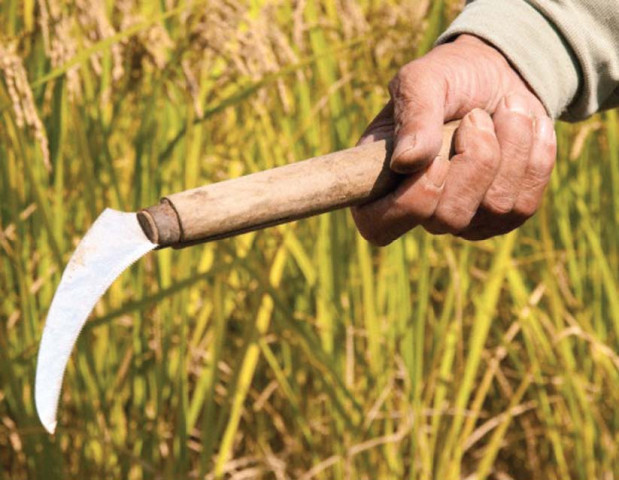Oxfam drive: ‘Dharti’ campaign launched to protect small farmers
Corporate farming acceptable only when it does not harm small growers.

Amid criticism, recommendations and appreciation, Oxfam, an organisation working to find solutions to poverty and injustice, launched its Grow campaign titled ‘Dharti’ (land) at a ceremony here on Wednesday.
The campaign aims to protect small farmers in Sindh through advocating their rights, government policymaking and imparting skills. It will allow marginal growers productive, sustainable and shock-resilient farming.
“We want to revive the broken global food production system through agricultural reforms. But our programme is biased (in favour of) small and marginal growers,” said Zia Mukhtiar, Bangladesh-based Regional Coordinator of Oxfam.
He said the programme, which was started simultaneously in 40 countries in June 2011, “is now progressing in 100 countries”.
According to Mukhtiar, rising food and oil prices, climate change, unfair trade, inequality between men and women, land grabbing and failing markets are contributing to a global food crisis.
Oxfam believes that the solution lies in strengthening small farmers who are capable of increasing crop yield if their exploitation comes to an end and if they are equipped with scientific applications in cultivation.
The initiative, nevertheless, is not completely opposed to corporate farming, even though it advocates equal and fair distribution of land. “It is only acceptable if it does not harm the interests of small growers and they are able to earn and produce enough,” said Mukhtiar.
Programme Manager Mahnaz Ajmal Paracha said the campaign would lobby for framing policies in favour of small farmers and would provide them humanitarian support.
Shahnaz, a woman peasant from Umerkot who was among four farmers who narrated their hardships, set the discourse through her moving account of events. “I was a flood victim, but I didn’t receive compensation from the government – free seeds and fertiliser – because I do not own a land.” She tills the fields of a landlord where she contributes labour and pays for half of the cost of agricultural inputs and gets half of the share from the produce.
Another peasant, Rasheeda, questioned the ruling party’s slogan of ‘roti, kapra aur makan’ (food, cloth and shelter), contending that agricultural reforms were a prerequisite for rural development.
Under the Grow drive, a 12-point charter of demands has been presented. It calls for free distribution of government land among landless peasants, residential land ownership rights for the poor, district-based peasant courts, farmer-friendly amendments to tenancy acts and an end to the exploitative middlemen system.
Other demands include a comprehensive agricultural policy to protect crops from climate changes, government’s investment to financially support marginal farmers and a ban on purchase of huge agricultural land by foreign investors.
“The agricultural sector should be given the status of an industry,” said Abrar Qazi, President of Awami Jamhori Party, while pointing out shortcomings in the charter.
Under the status, peasants will be provided with social security, old-age benefits, pensions and other facilities similar to those got by labourers.
Karamat Ali of the Pakistan Institute of Labour Education and Research (PILER) called on the peasants and labourers to unite to form a movement for their rights.
“Existing political parties are either feudal or capitalist and the two land reforms brought by Ayub Khan and Zulfikar Ali Bhutto were actually a mockery of reforms,” he said.
Ali supported PPP Sindh General Secretary Taj Hyder’s proposal for a law which could overrule the judgment of the Federal Shariat Court, which had allowed big landholdings.
“The passage of a pro-peasant Sindh Tenancy Act alone will not solve the problems,” said Hyder. “The farmers, civil society and elected representatives also need to work together to liberate agriculture from the legacy of Ziaul Haq – the Shariat Court’s judgment.”
Published in The Express Tribune, February 16th, 2012.



















COMMENTS
Comments are moderated and generally will be posted if they are on-topic and not abusive.
For more information, please see our Comments FAQ